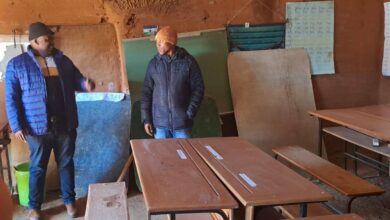The Surprising Shutdown of the Millennium Challenge Corporation (MCC) Compact Project in Lesotho: Implications for the Nation’s Economy and Development

Last week, the unexpected announcement of the U.S. government’s decision to shut down the Millennium Challenge Corporation (MCC) US$322 million Compact project in Lesotho sent shockwaves throughout the country. The decision, made by the U.S. Department of Government Efficiency (DOGE), came as part of a broader policy shift to curb foreign spending, halting both new and ongoing MCC projects, including Compact I and II. This sudden development has left local stakeholders in Lesotho scrambling to understand the consequences, as the nation faces a potential economic crisis with far-reaching impacts on its health, agriculture, and private sectors.
A Major Blow to Lesotho’s Health and Agriculture Sectors
For years, the MCC’s financial aid has been a cornerstone of Lesotho’s development, particularly benefiting critical sectors like healthcare, agriculture, and private business growth. The U.S. funding, aimed at boosting economic growth and poverty reduction, has been especially vital in creating job opportunities and improving services for marginalized groups, such as women, youth, and people with disabilities.
Compact II, which was launched in 2024 with a $300 million investment from MCC, promised significant improvements to the country’s healthcare system, agricultural productivity, and economic development. The project, branded as “Leboela la Seepa-mere,” was expected to create over 4,000 jobs and promote high-value crop production, improving access to quality healthcare and creating equitable opportunities for business development. With the abrupt cancellation of the Compact, these ambitious goals now face an uncertain future.
The Financial Ramifications for Lesotho’s Government Budget
Perhaps the most immediate impact of the MCC shutdown will be felt in Lesotho’s government financial planning. The closure of the Compact projects comes just as the government was finalizing its 2025/26 budget, which had been developed without accounting for the sudden loss of MCC funding. Thabo Qhesi, CEO of the Private Sector Foundation of Lesotho (PSFL), warned that the closure could exacerbate the country’s already challenging economic situation.
Without the MCC’s financial backing, Lesotho could find itself grappling with a weakened agricultural sector, which has long been a pillar of the country’s economy. The MCC’s focus on high-value crop production and agricultural development was expected to help reduce the country’s reliance on imports, particularly from South Africa. Without this crucial support, Lesotho’s agricultural output may decline, leading to food insecurity and a loss of income for many local farmers.
Health and Social Sector Disruption
The health sector will also bear the brunt of the MCC’s abrupt closure. The MCC’s support for healthcare projects aimed at improving access to essential services, particularly for vulnerable populations, was crucial in advancing Lesotho’s health outcomes. The U.S. government’s decision to halt funding may jeopardize ongoing health initiatives and make it more difficult for the government to address pressing public health challenges.
The Ministry of Health, along with other government agencies, has remained largely silent on the MCC closure, with officials deferring official comment. However, authoritative sources have confirmed that the U.S. government has indeed pulled the plug on the MCC, leaving stakeholders scrambling to figure out the next steps.
Shato Nhlapho, Executive Director of the Lesotho National Federation of the Disabled Persons (LNFOD), noted that the closure of the MCC funding highlighted the importance of diversifying funding sources. Nhlapho pointed out that, in response to diminishing foreign aid, LNFOD had launched a strategic plan to strengthen its own fundraising capacity to continue supporting persons with disabilities in Lesotho.
Political and Economic Consequences
The political fallout from the MCC shutdown is also expected to be significant. National Assembly Member Thabiso Lekitla expressed concern that the sudden withdrawal of MCC funding could worsen the already high unemployment rate in the country, which was expected to be alleviated through the Compact’s job creation initiatives. The loss of MCC-backed employment opportunities could exacerbate food insecurity, contributing to widespread poverty and social unrest.
The MCC’s departure could also have a ripple effect on the private sector, where small businesses that rely on the economic opportunities created by the Compact may face financial ruin. If the private sector falters, the overall economy of Lesotho may suffer, pushing the country closer to a state of economic failure.
A Changing Landscape for Foreign Aid in Lesotho
The MCC’s closure serves as a stark reminder of the volatility of foreign aid and the challenges Lesotho faces in ensuring sustainable economic growth. While foreign assistance has played a vital role in the country’s development, the recent shift in U.S. policy underscores the need for Lesotho to build its own economic resilience and reduce dependency on external support.
The abrupt end to the MCC Compact projects also calls into question the future of other foreign aid partnerships and the long-term viability of Lesotho’s development strategy. With the MCC’s performance-based aid model now in question, the government must urgently reconsider its financial planning and development priorities.
As Lesotho faces these challenges, the government must take immediate action to address the economic and social fallout from the MCC’s closure. The country’s leaders will need to find alternative funding sources, create new job opportunities, and protect vulnerable populations from the worst effects of this sudden change in foreign aid.
The unexpected shutdown of the Millennium Challenge Corporation’s Compact project in Lesotho is a major setback for the country’s economic development. The closure of these high-impact programs will reverberate across multiple sectors, affecting the government’s budget, agricultural productivity, and healthcare access. As the country grapples with this unexpected turn of events, the need for sustainable, locally-driven development solutions has never been more urgent. Lesotho’s leaders must rise to the challenge and find innovative ways to ensure that the country’s growth and progress are not entirely dependent on foreign aid.
Join 'Lesotho News' WhatsApp Channel
Get breaking Lesotho news — delivered directly to your WhatsApp.
CLICK HERE TO JOIN



